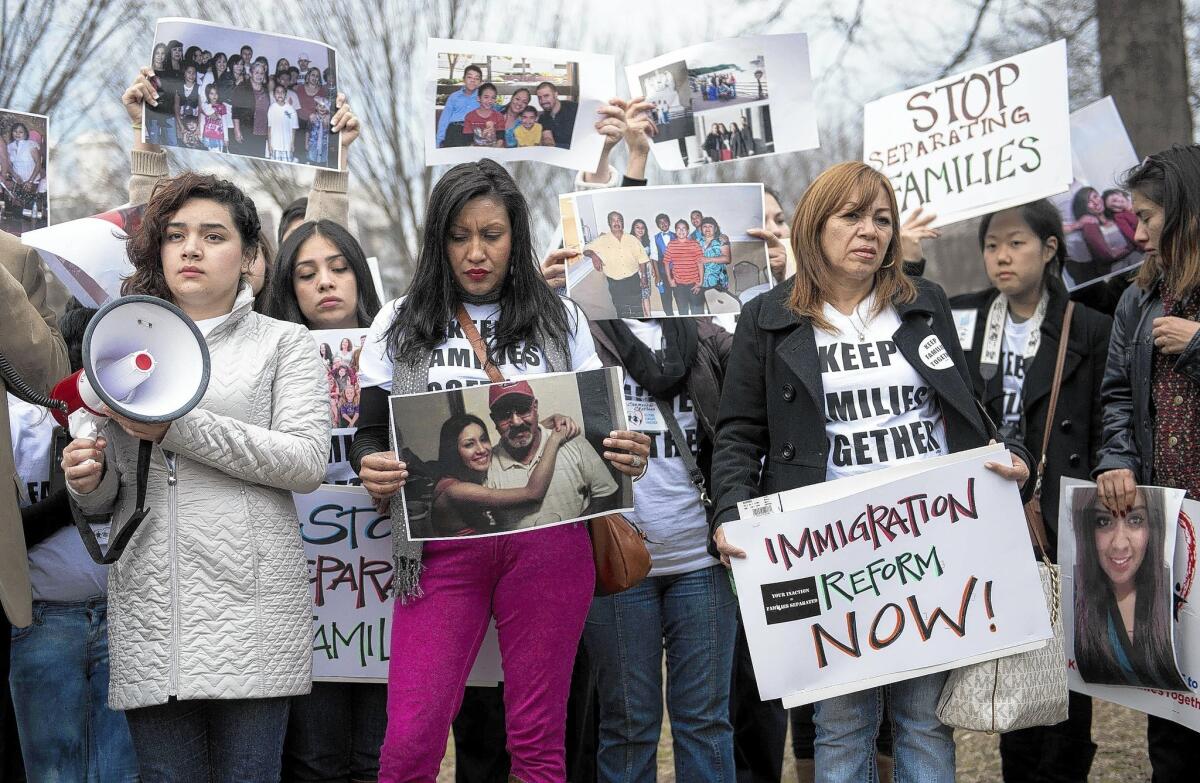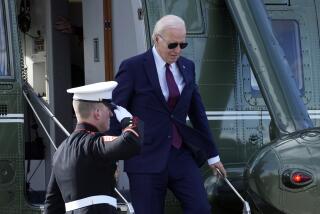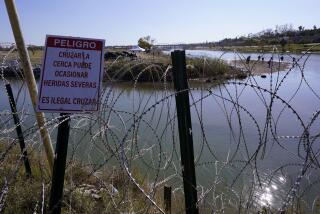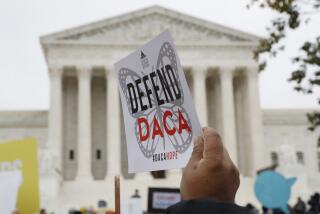Obama calls on Homeland Security to ease deportations

WASHINGTON — Under orders by President Obama to enforce immigration laws “more humanely,” Homeland Security officials are focusing on at least two major policy changes that would slow the pace of deportations of immigrants in the U.S. illegally.
But the White House has tentatively rejected proposals to expand an Obama administration program to allow the parents of young people who were brought to the country illegally to stay.
Officials said Friday that the changes under review would effectively stop most deportations of foreigners with no criminal convictions other than immigration violations, and focus enforcement efforts instead mostly at those charged or convicted of felony crimes or who pose more of a threat to public safety.
Thousands of people are deported every year who have overstayed their visas or entered the country illegally but have broken no other laws. Many are parents of children who are U.S. citizens.
Full coverage: Without a country
The deliberations mark a shift for the Obama administration, which has repeatedly insisted it has done all it can to make major changes in immigration policy on its own. Obama has said only the immigration legislation now stalled in the Republican-led House can fix what all sides describe as a broken system.
But a searing public campaign by immigration activists and lawmakers appears to have forced Obama to rethink his position. In recent days, former political allies caustically dubbed Obama the “deporter in chief” and Latino members of Congress threatened a resolution calling on him to ease the deportations.
Hoping to reunite the fraying coalition behind what may be the last major legislative effort of his presidency, Obama promised the Congressional Hispanic Caucus on Thursday that he would ask Jeh Johnson, secretary of Homeland Security, to look for changes “within the confines of the law.”
White House officials said Friday that the president had expressed interest in modifying policies to prevent the separation of families. His administration is on track to deport 2 million people by next month.
Peter Boogaard, spokesman for the Department of Homeland Security, said reports of specific changes under review were inaccurate. He said Johnson was taking a “hard look” at ways to “enforce our immigration laws effectively and sensibly, in line with our values.”
“It is fair to say that process is ongoing and will be conducted expeditiously,” he said.
Obama and his senior staff met Friday at the White House with 17 representatives of labor groups, Latino organizations and faith groups that are pushing for immigration reform. The president assured them he has “deep concern” for the pain of families separated by deportations.
“We’ve gotten the attention that we needed,” said Rep. Lucille Roybal-Allard (D-Downey).
The changes under consideration fall short of activists’ preferred solution: expanding a 2012 program created by Obama that allows some young people brought to the country illegally as children to remain. Many advocates want the program — called Deferred Action for Childhood Arrivals — broadened to include the children’s parents or other family members.
White House lawyers have considered expanding that program to include people in the country illegally who are related to a U.S. citizen and have a pending petition for permanent residency, according to an official who spoke on condition of anonymity because the discussions are sensitive.
In theory, about 1 million people could be eligible to apply for a two-year deferral of deportation and a work visa.
The White House is reluctant to enlarge the program for fear it might be difficult to defend in court.
The two changes under consideration are less dramatic but still significant.
Since 2011, U.S. Immigration and Customs Enforcement officials have been instructed to prioritize deportation of those who have multiple convictions and who pose a threat to the public. Immigration officials included what the agency calls “fugitive aliens” and “aliens who reenter the country illegally after removal” in that category.
That meant people who lost appeals in immigration courts, or ignored deportation orders, were put on priority lists for deportation. So were people who came back after they were bused across the border.
Removing these two groups from the priority list could allow thousands of parents of children born in America, as well as other family members, to stay, said Marshall Fitz, an immigration expert at the Center for American Progress, a liberal think tank in Washington.
The other change under review, officials said, would curb the detention of low-priority immigrants.
Under a program called Secure Communities, immigration agents can ask local jails to hold immigrants here illegally until federal agents can pick them up. Officials are considering adjusting the policy so agents could ask jails to hold only people who are accused of major crimes or otherwise qualify for deportation.
Officials are also considering reviewing detention center contracts to ensure conditions are adequate for holding immigrants.
kathleen.hennessey@latimes.com
More to Read
Start your day right
Sign up for Essential California for news, features and recommendations from the L.A. Times and beyond in your inbox six days a week.
You may occasionally receive promotional content from the Los Angeles Times.








